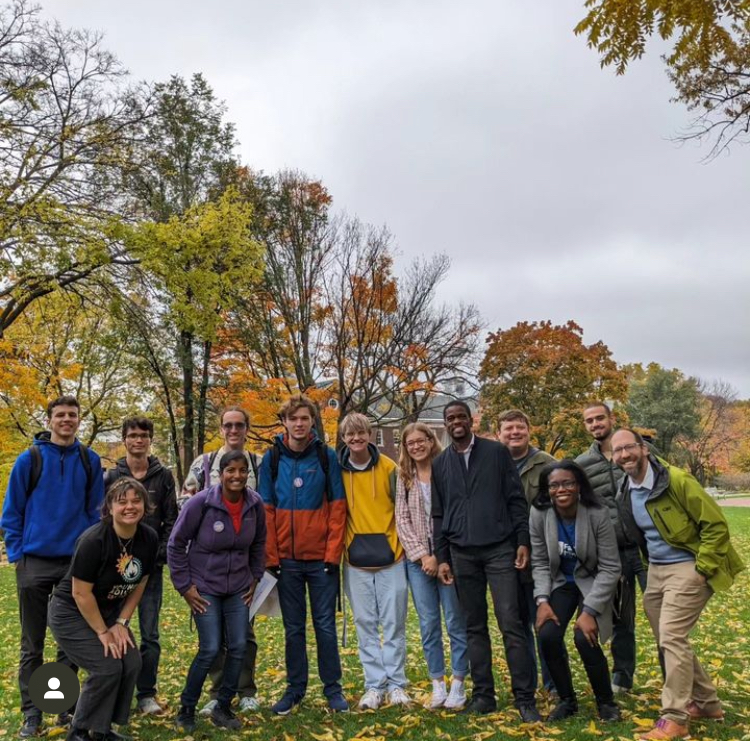Last November, Macalester voters — the majority of whom live in St. Paul’s Ward 3 — took part in an election to pick a new city council representative. Chris Tolbert, who had been the ward’s city council member for 12 years over three terms, was stepping down. The ballot included four candidates: Troy Barksdale F’23, Patty Hartman, Saura Jost and Isaac Russell.
Jost won the election with 48.5% of first-choice votes, and the other candidates soon conceded the race. Jost’s support was especially strong in the voting precinct in which Macalester’s campus sits, where she won 58.1% of votes. Backing from members of the Macalester community was an important component of Jost’s electoral success. It may soon become an important component of her time in office.
“Mac students are extremely engaged in politics,” Jost wrote in an email to The Mac Weekly. “I campaigned for and with students, and just a couple months into my time as a Councilor our office has had many meetings with student groups.”
Some Macalester students engaged with Ward 3’s city council race from an early point, making connections with Jost and Russell during Democratic-Farmer-Labor (DFL) caucuses in March of 2023.
The Macalester Organizing Coalition (MOCO), a student-led organization that aims to connect students with local opportunities for civic engagement, was one such group. In addition to helping organize students’ participation in the DFL caucus, MOCO brought Jost and other Ward 3 candidates onto campus
in both the spring and fall last year.
“From the beginning, [Jost] was like, ‘you are my constituents, I value what you think, you have valid ideas, even if you are young, even if you haven’t lived here for a super long time,’” Hannah Jenkins ’26, a MOCO leader, said. “Having that from the beginning was very important.”
Jost expressed a similar sentiment, writing “our district is home to three college communities and we have a lot of students mixed right in with community members who’ve lived here their whole lives, like myself. It’s important that we recognize that we are all residents who deserve to have their voices heard when it comes to our shared community.”
As council campaigns ramped up before November’s election, the Twin Cities chapter of the Sunrise Movement, a youth-led advocacy group focused on climate change, became a key ally to Jost’s campaign.
“When we saw the people who were running for Ward 3, Saura Jost immediately stuck out to us as someone who was a climate champion,” Hufsa Ahmed ’24, a leader of Sunrise Twin Cities, said.
Sunrise Twin Cities, which formally endorsed Jost, later helped create the climate platform for her campaign, and attended many of Jost’s campaign events both on and off campus. Ahmed says that the Sunrise Movement focused on helping present Jost as the most climate-forward candidate in her race. In her campaign, Jost frequently emphasized her focus on climate issues. She told The Mac Weekly that “unsurprisingly, climate is the most frequent issue I hear [about] from students.”
“I think a major, major reason why Saura did so well is because she partnered with Sunrise, and given how popular Sunrise is on campus, given how much people know about them, I would say that is a big reason why she was able to connect with Mac,” Jenkins said.
This campaign work may soon be translating to policy action in St. Paul’s City Hall. The Sunrise Movement recently announced an effort to pass a local Green New Deal resolution, which would commit the city to a set of goals around reducing carbon emissions while addressing social and environmental inequalities.
Ahmed described the Sunrise Movement as being in contact with the offices of both Jost and other city council members during this effort.
These climate-focused efforts represent just one example of the local policy efforts that both Jost and Macalester students have the opportunity to affect.
For example, housing is another prominent issue for Macalester students, given that many students live off-campus in their third and fourth years. In recent years, the St. Paul City Council has made substantial changes to its local zoning code to allow denser housing, debated the details of the city’s rent stabilization policy and considered other tenant protections.
These kinds of housing-related issues are likely to remain prominent in St. Paul. Jost wrote that she supports denser forms of housing and “a diversity in housing stock [that] will give our neighbors, including students, more flexibility.” Additionally, she wrote that “we should also be diligently finding ways to protect and support our renters. Renting should be a stable, affordable form of housing.”
Jost also discussed her support for more multimodal transportation options.
“I’d like to see increased and improved public transportation and cycling infrastructure in our city,” Jost wrote. “I would like to see pedestrians accommodated in a way where walking is an easy preferable option and not a risk or a chore.”
On April 24, the St. Paul City Council unanimously approved the city’s updated bike plan, which would greatly expand protected bike infrastructure throughout the city. There is also currently discussion about new transit investments — including a potential light rail train — along the Riverview Corridor, which would connect downtown St. Paul with the airport and largely travel through Ward 3.
As these policy making efforts advance, Macalester students have already been taking advantage of opportunities to engage. For example, at the April 17 City Council hearing for the updated bike plan, a group of students with the Macalester Urbanists group testified in support of St. Paul’s updated bike plan.
“A lot of times young people can feel like elected officials come to us for our vote, and then kind of just drop off the face of the earth. That is something that we want to try to prevent from happening,” Emma Runchey Smalley ’26, another leader of MOCO, said.
More broadly, Jost’s many connections with the Macalester community, and the local policy issues that affect them, demonstrate the value of students connecting with their local policymakers. Macalester students, most of whom come from outside of St. Paul, may not know much about their local representatives and how they can engage with local issues.
The policy issues that local representatives work on, however, can be impactful to the Macalester community. And as the work of Sunrise Twin Cities highlights, Macalester students also have agency and power to influence these policymaking processes.
“Our organization can have so much more impact and agency than we could have at a larger level,” Ahmed said. “As we continue to see polarization dominate our politics at the federal level, and even at the state level, turning to local politics can sometimes help relieve some of that polarization and allow for greater change that is so necessary for us to have success, both locally — and then from there being able to build up to higher levels of government.”







